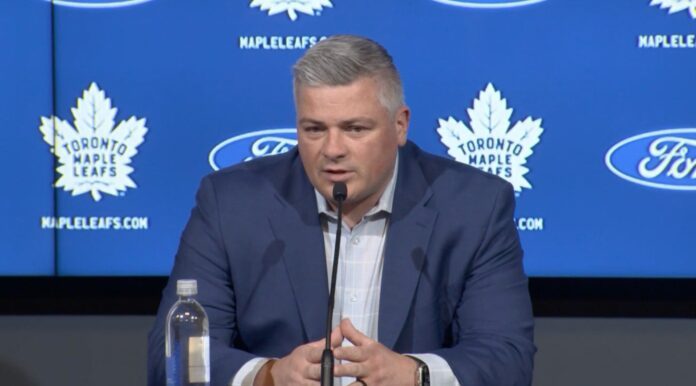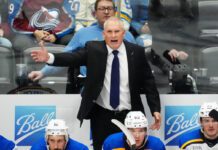
On locker cleanout day, head coach Sheldon Keefe discussed the heat Mitch Marner is facing in the Toronto market, the failure of the power play (1 for 21) in the series loss versus Boston, the offensive struggles year after year in the playoffs, and his role as head coach moving forward.
Opening Statement on the End of the 2023-24 Season
Keefe: Today is always a difficult day. It is really the worst day of the season. It should feel that way when you don’t meet expectations. Certainly, today is one of those days.
We are in the results business here. We didn’t get results. We haven’t met expectations. As head coach, I take responsibility for that. You have a team that has expectations and goals in mind, and you don’t reach them. It is not a good feeling.
My job as a head coach is to find solutions and chart a path ahead for the group to come through and succeed at the most important time of year. We haven’t done that.
A year ago, I do feel we took a step in the right direction as a group. I loved the resolve that we showed in this series in Game 5 and Game 6, in particular, to give us a chance to be in Game 7. But clearly, that is not enough. That sits with me.
Q&A
Mitch Marner has taken heat in the market from time to time, perhaps now more than ever. What do you make of that? What does he mean to the group now and moving forward?
Keefe: Mitch is an exceptional player who wants to win, and he wants to win here in Toronto. He did things in the series that really helped us have success and set us up for success. He took on some tough roles. He really helped stabilize our penalty killing and get our penalty killing going later in the series. There are things that Mitch Marner does that don’t show up on our scoresheet but are really important to our team.
Obviously, our entire team needs to score more and come through at key times. That is a big part of it. My job as a coach is to help the entire team, including Mitch, to come through in those moments. I failed to do so, and I will take responsibility for that.
Do you see any throughline in the lack of offense playoff after playoff?
Keefe: We look at this a lot. It is still fresh — and things happen quickly — but you reflect on it and discuss it.
In each of those playoffs, you look at some missed opportunities and wonder why. There are times when you have clean chances — breakaways, 2-on-1s, rebounds in tight — that tend to go in for you during the regular season, and now they are not.
As a coach, it is more about how you can help your players through that. Also, how can you generate more of it? I don’t think we generated enough of those — certainly more than what we executed on — but again this season, we faced a goaltender at the other end that is putting up top numbers in the league. Of course, that is part on the goaltender, the team you are playing against, and the job they do defensively. But my job is to find more ways to get through.
The other team’s goalie and penalty kill have a lot to do with it, but your power play was clicking so well in February and then started struggling to the point where it went 1-for-21 in the series against Boston. How perplexing is that to you? Was it an Xs and Os thing, an execution thing, or a combination of both?
Keefe: In February, we were number one in the NHL on the power play and were clipping along at a really high rate. We have been a top power play in the league for years. The power play was really good in the Tampa series a year ago and helped us in the playoffs. Otherwise, like our overall offensive game in the playoffs, it hasn’t met expectations or delivered for us. It hasn’t executed.
Was it perplexing? We spent a lot of time searching for answers. The fact that it has been good, has come through, and has looked elite at times — you go to that, and you want to build trust towards that. It is difficult to do when things don’t go well.
As we were talking about with our power play throughout the series, especially as we showed the type of resolve that we did later in the series to keep our season alive, it came through trust — players trusting in the plan, going out and executing, and giving absolutely everything that they have to execute the plan. To me, that is why we were able to find our way back in the series. The power play is no different. The skill is there.
Throughout this season, we tried different things. We moved different things around. Through the series, we moved things around and tried many different iterations of what the first unit looked like. Some of it was by design, and some of it was because players were in and out of our lineup. Ultimately, it comes down to execution, competitiveness—winning little puck battles and faceoffs—trusting and staying with it. That becomes harder to do as that number starts to grow.
The way the team showed belief in the plan at five-on-five is what we needed to come through on the power play. Frankly, in Game 7, the power play was good. We just didn’t put the puck over the line, which was the same story in Games 2 and 3.
The big number, if you focus on it, is not good, clearly. But there were times when the process was in place, and the process can work. You have to be able to beat the goaltender, ultimately. That is the missing piece. That is the hurdle there.
You mentioned that other teams set the Leafs up to beat themselves, referencing Games 3 and 4 in the series. What has made it challenging to counter that?
Keefe: In that comment, I was talking about a team that basically sits back in structure, forces you to come through them, and waits for you to make mistakes by forcing the issue and forcing the game while being impatient. A common theme and strategy around the league is to capitalize on mistakes and play in transition. I don’t think we are unique in how teams gameplan against us.
Certainly, the ways to counter it are the things we discussed all series: getting through the neutral zone quickly before structure is set, capitalizing on line changes, progressions, and sequencing, and the things that allow you to play when you are not against structure. When we are, it’s finding ways to charge through it, get through the neutral zone, get to the net, spend time in the offensive zone, and get on the inside.
It is not just in our series. If you look around the league, the later series wear on, offense seems to be harder to come by. Early in the series, we had no issues with that. We were generating a lot. We were leading the league in inner-slot shots, rebounds, and getting a lot of pucks in there in the first few games of the series. Those dried up later on in the series, but we were also playing way better defensively ourselves. We didn’t necessarily need as much offense to win games, with Games 5 and 6 as examples. The level of patience we showed in those games is ultimately what it takes to win in the playoffs.
That is why it is most disappointing to get it done in Game 7. We were right there. We were one shot away from getting through, and then quickly the narrative changes to: The Leafs have figured out how to play tight games, win tight games, come from behind, show fight, and all of these sorts of things that you are excited about. I came out of Game 6 feeling as good about the Toronto Maple Leafs as I have felt in this position. That was because of how we were playing and how the group had come together.
To not get it done in Game 7 is quite disappointing, but in terms of the strategy itself, the line I used with the players is, “It takes what it takes.” We have a group of 20 players who, when committed to playing as a group, can have success. We have to be able to stick with that and trust that for the long haul.
When you say you take responsibility for what happened, what form does it take next? What happens next for you?
Keefe: For me, it is looking for solutions and continuing to work and build upon the things that I just discussed. To me, this series that we just finished is the best I felt about our group in terms of his ability to perform, come through in the playoffs, and play a playoff-type of game.
There have been different parts here and there over the years. We found a way to win a series last year, but there was a lot about our process in that series against Tampa that wasn’t great. We came up big in big moments. We won overtime games. We tied games late. Special teams were good. A lot of things like that helped us through that series.
To me, our process, our buy-in, the physicality, the defending, and the patience that we showed throughout this series are the recipe. It takes what it takes. I feel like our group took big steps in that direction. That is something for us to build upon while continuing to search for solutions at five-on-five and on special teams.
What is your level of expectation that you will have an opportunity to see this through next season?
Keefe: I am in the coaching business. In the coaching business, you don’t get to make decisions about your position. For me, it is out of my control. My job is to find solutions, direct, and find a path for our team to continue to move forward. That is my focus.
I understand ownership and management make those types of decisions. As I said, I accept responsibility for not meeting results.
I believe in myself greatly. I love coaching the Toronto Maple Leafs. Now more than ever, I believe in myself and the team that I will win and the team will win. I have been through a lot as a coach in my career to get to this level. I have won a lot before coming here. The path always looks different, but you learn along the way. I have learned a lot through my experience. I know I am in a good place.
That decision is out of my control. My job is to continue to work to find solutions and continue to improve as a coach, but at the same time, take accountability for the fact that we haven’t met expectations.
The decisions are out of my control, but I would certainly like the attention and the focus to be on me. As the head coach, you are the leader. You have to be accountable when you don’t meet expectations.
Morgan Rielly was mentioning how badly he feels about being on the ice for David Pastrnak’s series-ending goal. From your perspective, where did the breakdown or breakdowns happen on the goal?
Keefe: First off, I haven’t spent a tremendous amount of time going through it. I have seen it, but when it is over, it doesn’t do a lot of good. You are not going to change anything in these short days.
Obviously, we get their best player flying through the neutral zone, and we don’t pick him up coming through. That is the challenge. It is a tough one because I actually thought we had done a tremendous job through the neutral zone in defending with structure throughout the series. Games 5 and 6, in particular, were probably the best we have been all season long in that regard. On that one, we didn’t pick it up, got a tough bounce, and didn’t get a save.
What do you hope to learn or glean from today’s exit interviews?
Keefe: Each season is different, and I have gone about it in different ways in different seasons. A lot of the time, you take the direction of the General Manager and how they want to handle it. In the past, I have done it with the GM. I have done it separately. At times, I haven’t done it.
This season, in particular, Tre gave me the option to have the meetings with players. In the past, his coaches haven’t. I elected not to today. Personally, I went with more casual interactions around the facility today, seeing guys off and opening the door for more meaningful conversations in the offseason.
To me, that is really what it is about. Because the season ends so quickly, there is not a lot of value you get out of the exit meetings. From the GM’s perspective, it is more about giving direction on the offseason, training, and what is going to happen. It is more of a formality that a lot of teams do.
For me, it is more feeling my way through. I spoke with the team after the loss the other night more than I have in any season in the past. I let them know how I felt about the team and about the group.
As I opened with, this is not a great day. Not a lot of productive things get done today, but it is a chance to see the guys off and open the door for more meaningful discussions later on.





























![New Leaf Anthony Stolarz on the opportunity in Toronto: “In Florida, I knew my role as a backup… Now, [Joseph Woll] and I are competing for starts… As a goalie, that’s all you can ask for” Anthony Stolarz, Stanley Cup win, now Maple Leaf](https://mapleleafshotstove.com/wp-content/uploads/2024/07/anthony-stolarz-sc-100x70.jpg)
